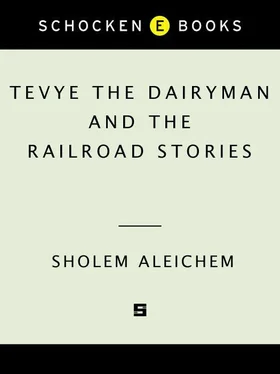One more word on the subject.
Not long ago I gave a talk on Tevye the Dairyman to a small audience in the town in Israel where I live. A lively discussion ensued, during which one of the participants, a professor of the history of science, exclaimed angrily, “But Tevye is a fool! Instead of realizing once and for all that there is no God, and that his own life is the best proof of it, he goes on wasting his energy on a God who doesn’t exist.” It was a perfectly natural comment and it led to an even more animated exchange, but as that went on, I kept asking myself, where have I heard those words before? And then it came to me: Job’s wife! “And then his wife said to him, ‘Do you still hold fast to your integrity? Curse God, and die!’ ”
For Job — and for Tevye — to curse God is to die, because neither can live in a world without Him. Even if God never answers, even if He never will, Tevye must go on debating with Him, for the minute he stops, his life has lost its meaning. And besides, who is to say when God answers and when He does not? In Job’s case, you say, it was obvious: “And then the Lord answered Job out of the whirlwind.” Yes: but had you or I been present in that whirlwind, would we have heard anything but wind? “So the Lord blessed the latter end of Job more than the beginning: for he had fourteen thousand sheep, and six thousand camels, and a thousand yoke of oxen, and a thousand she-asses. And he also had seven sons and three daughters.” Tevye has exile and the road beneath his feet — and the daughter he loves most, Chava, restored to him from the dead. The Lord giveth and the Lord taketh away. And what shall Tevye call that which sometimes giveth again?
Tevye’s habit of peppering his Yiddish speech with endless quotations from sacred Hebrew sources is his most distinctive verbal quirk and, on the whole, the thorniest problem he presents to the translator. It does not, however, make him unique. The tendency liberally to cite Scripture and liturgy was widespread among speakers of Yiddish, as it must always have been among observant Jews everywhere, who, merely in the course of their daily prayers and their weekly and yearly rituals, commit to memory an enormous number of texts. It was and is not unusual, for example, for a simple, uneducated Jew to know by heart the three daily Hebrew prayers, which even recited at breakneck speed would take a good half hour to get through, plus various other devotions, blessings, and bits of the Bible. In the work of Sholem Aleichem, too, Tevye is by no means the only chronic quoter, even if he is an extreme case for whom chapter and verse, depending on the situation and the person he is talking to, can serve any conceivable purpose: to impress, to inform, to amuse, to intimidate, to comfort, to scold, to ridicule, to show off, to avoid, to put down, to stake a claim of equality or create a mood of intimacy, and so on. He has, as his daughter Chava says, a quote for everything, and sometimes one quote for several things, for his stock is ultimately limited and he has to make the most of it.
In traditional Jewish terms, that is, Tevye is not nearly so erudite as the uninformed reader, or some of his own unversed acquaintances, may think. (Of course, such things are relative; there are not a few American Jewish congregations today in which he would have to be considered a highly learned Jew, second only — and not even always that — to the rabbi.) An analysis of his quotations shows that nearly all of them come from four basic sources, each read and heard year in and year out by the average Orthodox Jew: the daily and holiday prayer book; the Bible (especially the Pentateuch, portions of which are read every Sabbath; the Book of Esther, which is chanted on Purim; and Psalms, which observant Jews often recite as a paternoster when troubled or in their spare time); the Passover Haggadah; and Pirkey Avot or “The Ethics of the Fathers,” a short Mishnaic tractate of rabbinic sayings that is printed in the Sabbath section of the prayer book. Of the rest of the Mishnah and of the Talmud, to say nothing of the many commentaries upon them — the real bread and butter, as it were, of a higher Jewish education — he appears to know next to nothing. Indeed, when he wishes to quote a line of Talmud to Layzer Wolf, he has to make it up out of whole cloth.
Yet if Tevye is no scholar, neither is he the Yiddish Mr. Malaprop that others, overly aware of these limitations, have taken him to be. To be sure, he does occasionally clown, deliberately inventing, confusing, or misattributing a quote in order to mock an ignoramus who will never know the difference, thus scoring a little private triumph of which he himself is the sole witness. On the whole, however — and certainly when directly addressing Sholem Aleichem, who is his superior in Jewish knowledge and whose approval he desires — his quotations are accurate, apropos, and show an understanding of the meaning of the Hebrew words, if not always of their exact grammar. Sometimes they are even witty, taking an ancient verse or phrase and deliberately wrenching it out of context to fit the situation he is talking about, as when, at the beginning of “Hodl,” in discussing how hard it is for a Jewish youngster to be accepted by a Russian school, Tevye says, “Al tishlakh yodkho: [2]they guard their schools from us like a bowl of cream from a cat.” The words al tishlakh yodkho mean “lay not thine hand” and are found in the story of the sacrifice of Isaac in Chapter 22 of Genesis, in which, at the last second, just as Abraham is about to slaughter his son, an intervening angel cries out, “Lay not thine hand upon the lad, neither do thou anything unto him; for now I know that thou fearest God, seeing thou has not withheld thy son, thine only son, from Me.” Tevye knows perfectly well where the phrase he is quoting comes from (the highly dramatic chapter is not only read once a year on the Sabbath like the rest of the Pentateuch, it is chanted a second time as a special selection for Rosh Hashanah) — but this does not keep him from putting it in the mouths of Czarist officials telling Jewish applicants to keep their hands off Russian schools!
Here too, it must be stressed, there is nothing particularly original about his method: Jews have been “deconstructing” biblical texts in this way practically since the Bible was written, and the vast corpus of rabbinical exegesis known as the midrash is based precisely on the enterprise of pouring new wine into old Scriptural bottles. Though these reinterpretations are not generally humorous, there is definitely a creative playfulness in the activity of midrash per se , which was, one might say, the ancient rabbis’ chief form of recreation — and to this day, if one has the good luck to be among a group of knowledgeable Jews who are in a “midrashic” mood, one can witness this fascinating interplay of encyclopedic recall and wit in which biblical and rabbinic texts are caromed around and off each other as though they were billiard balls. Tevye is not quite in this league, but it is one he aspires to, for a religiously educated Jew in the traditional culture of Eastern Europe belonged to a universally recognized aristocracy of the spirit, regardless of his economic status. The riches Tevye dreams of are a mirage; yet the opportunity to rise above his station by a vigorous display of a body of knowledge that, while not large, he is in total command of, is a subjective and objective reality that he exploits to the utmost, and sometimes a bit beyond.
How, though, can this reality be translated into English? Theoretically, the translator has four choices:
1. He can give Tevye’s quotations in English instead of in Hebrew.
2. He can give them both in English and in Hebrew, the latter transliterated into Latin characters.
Читать дальше












